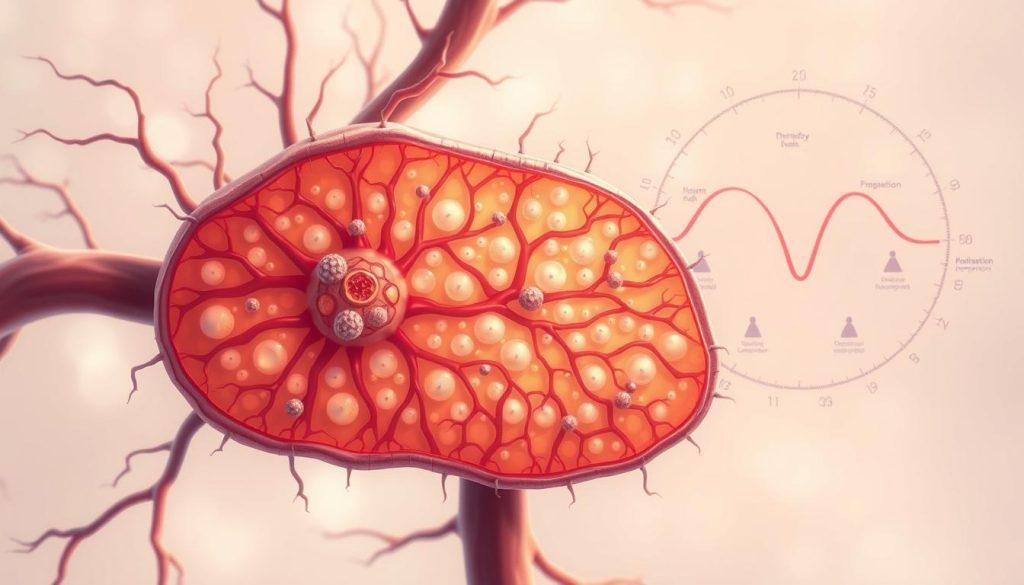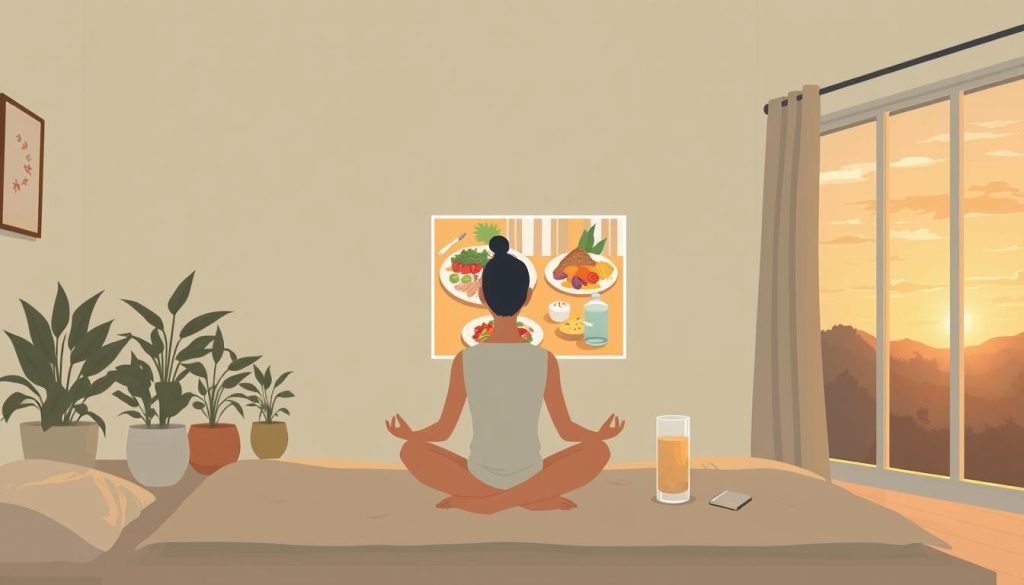Your body is like a symphony, with two main players. Your immune system fights threats all day. Your circadian rhythms keep everything in sync.
These systems talk to each other all the time. They share info on when to defend and when to heal.
Knowing how they work together is crucial. Bad sleep affects your immune system. It makes it harder to fight off sickness and heal.
Recent studies have uncovered interesting facts. They show your body’s defenses change throughout the day. This knowledge helps us find better ways to stay healthy.
Understanding the Immune System
Your immune system is like a personal security team for your body. It works all the time, adapting to threats and protecting you. It’s amazing to think about how it keeps you safe every day.
It doesn’t work alone. It works with your body’s natural rhythms to keep you safe. This teamwork makes sure you’re protected when you need it most.
What is the Immune System?
Your immune system is a complex network that defends your body. It fights off harmful substances like bacteria and viruses. It’s like a military force with different units working together.
This system remembers past threats. If it meets a pathogen again, it can fight it off faster. This makes your immune system more effective over time.

The immune system has two main parts: innate and adaptive immunity. Innate immunity offers general protection right away. Adaptive immunity creates specific responses that get better with time.
Key Components of the Immune System
White blood cells are the main soldiers of your immune system. They search your body for anything harmful. Antibodies are like guided missiles that target specific threats.
Cytokines are chemical messengers that help your immune system work together. They coordinate the response between different cells and organs.
Important organs in your immune system include:
- Bone marrow, where immune cells are produced
- Thymus, which trains certain white blood cells
- Spleen, which filters blood and stores immune cells
- Lymph nodes, which trap and destroy harmful substances
How the Immune System Protects Us
Your immune system uses many strategies to keep you healthy. It creates barriers like your skin to keep invaders out. These barriers are like the walls of a fortress.
When invaders get past these barriers, your immune system attacks. Specialized cells identify the threat and sound the alarm. Cytokines then call for backup and coordinate the response.
Your immune system’s activity changes throughout the day. It follows your body’s internal clock. This ensures your defenses are strongest when you need them most.
It also gets better with time. Your immune system learns from each encounter. This means it becomes more efficient at protecting you as you age.
The Circadian Cycle Explained
Deep in your brain, a master clock controls your wake and sleep cycle. It works all day to keep your body in sync. Knowing how it works can help you stay healthy.
Your circadian cycle does more than just tell you when to sleep. It also controls your body temperature, hormone levels, and hunger. When it’s off, your health can suffer in unexpected ways.
What is the Circadian Cycle?
The circadian cycle is your body’s 24-hour clock for sleep and wake. It’s in a small part of your brain called the suprachiasmatic nucleus. This clock responds to light and dark to guide your body’s functions.
This cycle doesn’t just make you sleepy. It also controls hormone production, body temperature, and digestion. It’s like a daily schedule for your body.

Light is key to keeping your internal clock in sync. Morning light tells your brain to stay awake. As night falls, your body gets ready for sleep by becoming less alert and cooler.
Importance of Sleep in the Circadian Cycle
Sleep is more than just rest. It’s when your circadian cycle does its most critical work. At night, your brain makes melatonin, a hormone that tells you it’s time to sleep.
Good sleep helps your circadian cycle reset for the next day. When you sleep well, your internal clock stays in sync with the day-night cycle. This keeps your hormones, body temperature, and immune system working right.
But, disrupting your sleep can mess up your circadian rhythm. Irregular sleep, bright lights at night, or traveling across time zones can confuse your clock. This messes up melatonin production and makes it hard for your body to stay in sync.
The Connection Between Immune System and Circadian Cycle
Your immune system doesn’t work the same way at all hours. It follows a precise schedule tied to your circadian rhythms. This discovery has changed how we see the body’s defense against threats. The field of chronobiology has shown that immune function operates on a 24-hour cycle, just like sleep and wake patterns.
Research shows that your body’s defense mechanisms are strongest during certain times of day. This timing isn’t coincidental. Your internal clock coordinates immune responses to match when you’re most likely to encounter pathogens or need healing.

Daily Patterns of Immune Activity
Scientists studying chronobiology have found that different immune cells peak at specific times. White blood cells, your body’s primary defenders, are most active during the day when you’re awake and moving around. This makes sense because daytime is when you’re most likely to encounter germs and need protection.
T-cells, which fight infections, reach their highest numbers in your bloodstream during the afternoon. Meanwhile, natural killer cells that destroy virus-infected cells are most active at night. This coordinated timing helps your body maintain optimal defense around the clock.
Inflammation levels also follow predictable daily patterns. Your body naturally produces more inflammatory responses in the morning to prepare for daily activities. This is why you might notice stiffness or soreness feels worse when you first wake up.
The timing of these immune responses explains why you often feel sicker at night. Your body temperature naturally rises in the evening as part of immune activation. Symptoms like fever, aches, and fatigue become more noticeable when your circadian cycle shifts focus to healing and recovery.
Hormonal Control of Immune Function
Hormones act as messengers between your circadian cycle and immune system. Cortisol, often called the stress hormone, plays a crucial role in this communication. Your body releases cortisol in a daily rhythm, with levels highest in the morning and lowest at night.
Morning cortisol helps control inflammation and prepares your immune system for the day ahead. It prevents excessive immune responses that could harm healthy tissues. When cortisol levels drop at night, your immune system becomes more active in fighting infections and repairing damage.
Growth hormone, released primarily during deep sleep, supports immune function in different ways. It helps produce new immune cells and repairs tissues damaged during the day. This is why quality sleep is essential for maintaining strong immunity.
Melatonin, your body’s natural sleep hormone, also influences immune responses. It acts as an antioxidant and helps regulate inflammation. The timing of melatonin release signals to your immune system when to shift from daytime vigilance to nighttime repair mode.
Understanding these connections has practical implications for healthcare. Vaccines may be more effective when given at specific times of day. Some medications work better when timed with your circadian rhythms. This knowledge from chronobiology research is opening new possibilities for personalized medicine based on your body’s natural timing.
Effects of Sleep on Immune Function
Sleep does more than just recharge your batteries. It also boosts your body’s ability to fight off diseases. While you sleep, your immune system works hard to produce cells that fight infections. This is why you’re more likely to get sick if you don’t get enough sleep.
Sleep and immunity are closely linked. Your body makes more T-cells, which fight viruses, when you sleep. Your bone marrow also makes more white blood cells during deep sleep. These cells help your immune system fight off challenges the next day.
The Impact of Sleep Deprivation
Just one night of bad sleep can weaken your immune system by up to 70%. This happens because sleep deprivation messes with cytokine production. Cytokines are proteins that help your immune system work right.
Working at night can also hurt your immune system. Night shift workers often get sick more often and take longer to get better. Their bodies have trouble making immune cells when it’s dark.
Jet lag also weakens your immune system. Travelers often get sick after long flights. This is because jet lag messes with your body’s internal clock, making you more vulnerable to illness.
Even a little bit of sleep loss adds up over time. This is called sleep debt. It doesn’t just make you tired; it also weakens your immune system. People who sleep less than six hours a night are four times more likely to get a cold.
Sleep Quality and Immune Response
The quality of your sleep is just as important as how much you sleep. Waking up a lot during the night stops your body from getting full sleep cycles. These cycles are key for a strong immune system.
Deep sleep helps repair tissues and supports immune cell growth. REM sleep is important for learning to fight off threats. It helps your body remember how to respond to infections.
Irregular sleep schedules mess with your body’s natural rhythms. Your immune system does best when it knows what to expect. Going to bed and waking up at different times each day confuses your body.
Sleep disorders like sleep apnea cause chronic inflammation. This diverts immune resources away from fighting infections. People with untreated sleep apnea often get sick more often and take longer to recover.
Keeping your body cool while you sleep is also important for your immune system. Your body temperature drops during sleep, which helps with immune processes. Sleeping in a too-warm environment can mess with this natural cooling and weaken your immune response.
Lifestyle Factors Influencing Both Systems
Simple lifestyle choices are like invisible threads that connect your immune system and biological clock. These daily habits either help or hurt both systems. Knowing how your habits affect these processes lets you make changes for better health.
Your environment sends signals to your body through external cues called zeitgebers. Light, meal times, exercise, and social interactions are these cues. When these cues match your natural rhythms, your immune system and circadian cycle work best.

Nutrition and Immune Health
What you eat affects your immune system’s strength. Eating foods rich in vitamins C and D, zinc, and antioxidants helps your immune cells. These nutrients are key for a strong immune response.
Eating at regular times is as important as what you eat. It helps keep your circadian rhythms in sync. Eating late can mess up your sleep and weaken your immune system. Your body likes food at set times, and irregular eating can upset your biological clock.
Some foods help, while others hurt both systems. Foods high in sugar and unhealthy fats cause inflammation and disrupt sleep. On the other hand, foods with omega-3 fatty acids, fiber, and natural compounds support immune health and sleep.
Caffeine needs careful timing to avoid affecting your circadian rhythms. While it has health benefits, too much caffeine at night can hurt sleep. This weakens your immune system, starting a cycle of declining health. Enjoy caffeine in the morning to avoid sleep problems.
Exercise and Circadian Rhythms
Regular exercise boosts your immune system and helps regulate your internal clock. It increases immune cells and reduces inflammation. This strengthens your immune responses over time.
Working out in the morning helps set your wake-up time and improves sleep. Consistent exercise schedules train your body to expect activity at specific times. This strengthens your circadian rhythm.
However, exercising too close to bedtime can disrupt sleep. Your body needs time to cool down and prepare for sleep. Finish intense workouts at least three hours before bedtime to avoid sleep problems.
Outdoor exercise also benefits both systems. Natural sunlight helps regulate melatonin and vitamin D production. Even a short walk outside during the day can offer these benefits.
Managing stress is key for both systems. Chronic stress weakens your immune system and disrupts sleep. Practices like meditation, deep breathing, or yoga can help balance your immune system and circadian rhythms.
Improvements in one area often benefit others. Better sleep boosts your immune system, while exercise improves sleep quality. Proper nutrition supports both systems, creating a positive cycle of health. Small, consistent changes in your daily habits can lead to big improvements in immune strength and circadian timing.
Tips for Harmonizing Your Immune System and Circadian Cycle
Your daily choices can help your immune system and body clock work better together. By living in sync with your natural rhythms, you boost both systems. Small, consistent changes can lead to big health improvements.
Understanding the connection between your immune system and body clock is key. They respond to similar cues. Focus on habits that support both for better health.
Creating Your Perfect Sleep Schedule
Setting a regular sleep schedule is crucial for immune health and body rhythm. Your body likes routine, especially with sleep and wake times. Choose a bedtime for 7 to 9 hours of sleep and stick to it, even on weekends.
Start winding down two hours before bed. Dimming lights signals your body it’s time to sleep. This helps produce melatonin, aiding sleep and immune function.
Make your bedroom sleep-friendly. Keep it cool, between 65-68°F, for better sleep. Use blackout curtains or masks to block light, which can disrupt sleep and weaken immunity.
Develop calming pre-sleep routines. Try stretching, reading, or deep breathing. Avoid screens for at least an hour before bed to prevent melatonin disruption.
Morning sunlight is also key for sleep. Get outside within 30 minutes of waking. This resets your body clock and boosts vitamin D, supporting immunity.
Nutritional Support for Dual System Health
Some foods support both your immune system and body clock. Adding these to your meals can help your systems work in harmony. Choose whole foods for the best benefits, not just supplements.
Evening meals with tryptophan help with melatonin and immunity. Turkey, eggs, cheese, and pumpkin seeds are good choices. Pair them with complex carbs like sweet potatoes or quinoa for better tryptophan absorption.
Magnesium-rich foods are great for sleep and immune health. Dark leafy greens, nuts, seeds, and whole grains are good sources. Almonds are a great snack for their magnesium and healthy fats.
Antioxidant-rich foods protect your immune system and support sleep. Berries, cherries, and dark chocolate are good choices. Tart cherry juice, with its melatonin, is great before bed.
Eating big meals during the day helps your metabolism and immune system. Avoid heavy meals close to bedtime to keep sleep and immunity strong.
Drink water all day but cut back two hours before bed to avoid sleep issues. Herbal teas like chamomile or valerian root can help relax and support immunity in the evening.
Include omega-3 fatty acids in your diet for immune and circadian rhythm support. Salmon, walnuts, and flaxseeds are good sources. Aim for these foods three times a week for best results.
Consistency is more important than perfection in these strategies. Start small and build up. Your body will respond well to gentle, consistent changes.
The Future of Research on Immunity and Circadian Rhythms
Scientists are discovering how our immune system and circadian cycle work together. This research is promising to change health and medicine soon.
Potential Studies and Discoveries
Researchers at Stanford University and Harvard Medical School are looking into timing and vaccine effectiveness. They found that getting vaccinated at certain times can improve immune responses. Sleep labs are also studying how shift workers can support their natural rhythms.
New studies aim to create personalized medicine plans. Scientists want to tailor treatments to each person’s circadian patterns. This could help those with autoimmune diseases like rheumatoid arthritis and multiple sclerosis.
How This Knowledge Can Improve Health
Future treatments might use chronotherapy principles. Doctors could time medications to match your body’s natural cycles. This could make treatments more effective and reduce side effects.
This research could help millions of people. Night shift workers, frequent travelers, and those with sleep disorders might benefit from new guidelines. Simple changes in daily routines could strengthen both systems.
While scientists continue their work, you can start using what we already know. Good sleep habits, regular meal times, and consistent daily schedules support both your immunity and natural rhythms right now.

